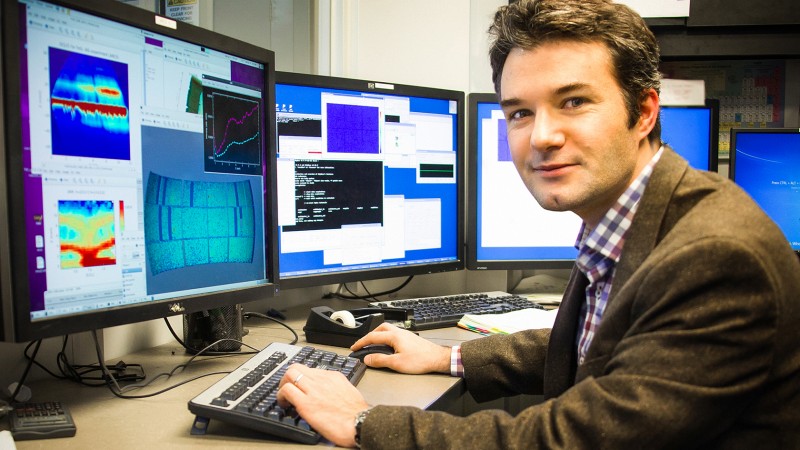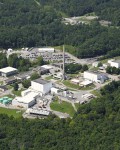Olivier Delaire, a scientist at the Department of Energy’s Oak Ridge National Laboratory, has won a prestigious Early Career Award from DOE’s Office of Science to study how heat propagates, or moves, through matter at an atomic level.
Delaire will receive $2.5 million over five years for his work, which holds potential for developing next-generation materials and energy-saving technologies.
“It’s exciting to work on fundamental properties of materials, and it has societal relevance,” said Delaire, a staff scientist in ORNL’s Scattering and ThermoPhysics Group, part of the Materials Science and Technology Division.
Delaire, who arrived at ORNL in 2008 as a Clifford G. Shull Fellow, is one of 35 scientists selected from across the United States for DOE’s Early Career Award, which drew some 750 proposals from national labs and universities. He won for the proposal “Quasiparticle Couplings in Transport of Heat, Charge, and Spin for Novel Energy Materials.”
“Olivier is taking advantage of ORNL’s broad scientific capabilities to study a problem of great interest,” ORNL Director Thom Mason said. “By understanding energy transfer, magnetism and other properties at the level of atoms, we can potentially design materials that either waste less energy or generate energy in new ways. Olivier is doing important work, and we’re proud that his efforts have been recognized with an Early Career Award.”
Delaire will use neutron and X-ray scattering, computer simulations, synthesis and characterization to investigate the microscopic structure and dynamics of materials. For instance, his research will probe quantum vibrations of atoms that explain how heat flows can be manipulated in thermoelectrics – materials that convert differences in temperature into an electric voltage.
Understanding such atomic vibrations also lends insight into how these vibrations influence electric currents, nanostructures and magnetic properties. Manipulating these properties has implications for a range of materials used to harvest or manage heat, including semiconductors, thermal barrier coatings and spin-caloritronics—a new class of materials that leverage energy in the form of heat.
A study by Sandia National Laboratories found that more than half the energy produced in the United States is lost, typically in the form of heat, so there’s great interest in finding ways to capture and use heat that’s now going to waste.
“This has been an exciting time to work at ORNL and to do the ambitious research I do with the instruments at the Spallation Neutron Source,” Delaire said. “With talented collaborators, I have had opportunities to do research here that I would not have had anywhere else.”
Delaire, who earned his doctorate from the California Institute of Technology, works with ORNL scientists across divisions including the Quantum Condensed Matter Division at SNS and the High Flux Isotope Reactor, as well as theory and synthesis groups in the Materials Science and Technology Division. He is also a collaborator in the DOE-funded S3TEC Energy Frontier Research Center at MIT.
UT-Battelle manages ORNL for the Department of Energy’s Office of Science. DOE’s Office of Science is the single largest supporter of basic research in the physical sciences in the United States, and is working to address some of the most pressing challenges of our time. For more information, please visit http://science.energy.gov.





